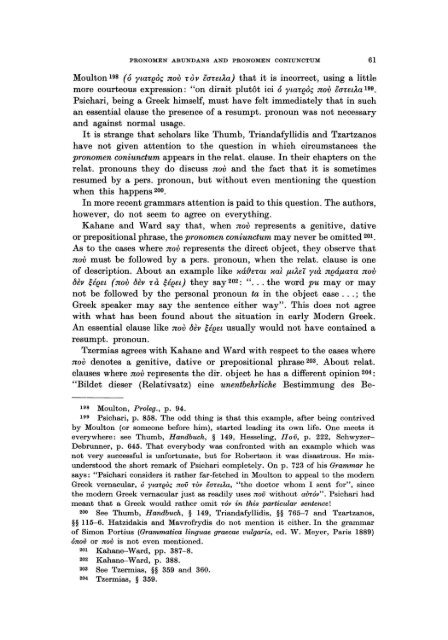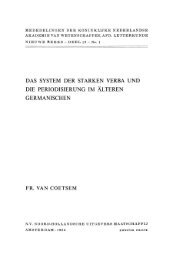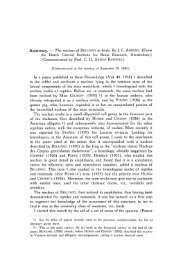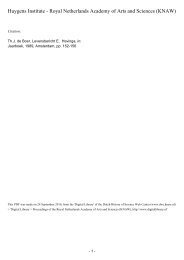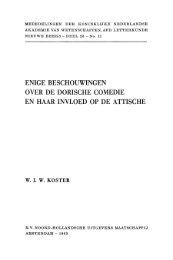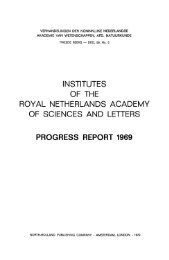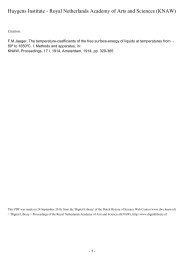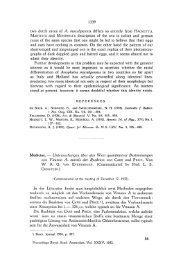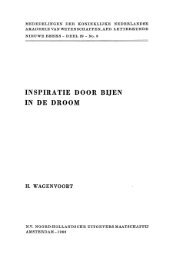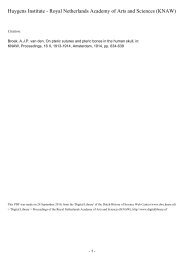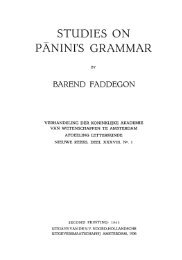Pronomen Abundans and Pronomen Coniunctum. A ... - DWC
Pronomen Abundans and Pronomen Coniunctum. A ... - DWC
Pronomen Abundans and Pronomen Coniunctum. A ... - DWC
Create successful ePaper yourself
Turn your PDF publications into a flip-book with our unique Google optimized e-Paper software.
PRONOMEN ABUNDANS AND PRONOMEN CONIUNCTUM 61<br />
Moulton 198 (ó yta.eàç nov • à v Ë(]UlÀa) that it is incorrect, using a little<br />
more courteous expression : "on dirait plutöt ici ó yta.eàç nov Ë(]UlÀa 199.<br />
Psichari, being a Greek himself, must have feIt immediately that in such<br />
an essential clause the presence of a resumpt. pronoun was not necessary<br />
<strong>and</strong> against normal usage.<br />
It is strange that scholars like Thumb, Tri<strong>and</strong>afyllidis <strong>and</strong> Tzartzanos<br />
have not given attention to the question in which circumstances the<br />
pronomen coniunctum appears in the relat. clause. In their chapters on the<br />
relat. pronouns they do discuss nov <strong>and</strong> the fa ct that it is sometimes<br />
resumed by a pers. pronoun, but without even mentioning the question<br />
when this happens 200.<br />
In more recent grammars attention is paid to this question. The authors,<br />
however, do not seem to agree on everything.<br />
Kahane <strong>and</strong> Ward say that, when nov represents a genitive, dative<br />
or prepositional phrase, the pronomen coniunctum may never be omitted 201.<br />
As to the cases where nov represents the direct object, they observe th at<br />
nov must be followed by a pers. pronoun, when the relat. clause is one<br />
of description. About an example like xá{}ewl xai fllÀei ylà neáflaw nov<br />
dèv ~Éeel (nov dèv .à ~Éeel) they say 202: " ... the word pu mayor may<br />
not be followed by the personal pronoun ta in the object case ... ; the<br />
Greek speaker may say the senten ce either way". This does not agree<br />
with what has been found about the situation in early Modern Greek.<br />
An essential clause like nov dèv Ueel usually would not have contained a<br />
resumpt. pronoun.<br />
Tzermias agrees with Kahane <strong>and</strong> Ward with respect to the cases where<br />
nov denotes a genitive, dative or prepositional phrase 203. About relat.<br />
clauses where nov represents the dir. object he has a different opinion 204:<br />
"Bildet dieser (Relativsatz) eine unentbehrliche Bestimmung des Be-<br />
198 Moulton, Proleg., p. 94.<br />
199 Psichari, p. 858. The odd thing is that this example, af ter being contrived<br />
by Moulton (or someone before him), started leading its own life. One meets it<br />
everywhere: see Thumb, H<strong>and</strong>buch, § 149, Hesseling, IJ ov, p. 222, Schwyzer<br />
Debrunner, p . 645. That everybody was confronted with an example which was<br />
not very successful is unfortunate, but for Robertson it was disastrous. He misunderstood<br />
the short remark of Psichari completely. On p. 723 of his Grammar he<br />
says: "Psichari considers it rather far-fetched in Moulton to appeal to the modern<br />
Greek vernacular, ó ytaT(!OÇ nov TOV [(]TE/Äa, "the doctor whom 1 sent for", since<br />
the modern Greek vernacular just as readily uses nov without aVTóv". Psichari had<br />
meant that a Greek would rather omit TÓV in this particular sentence!<br />
200 See Thumb, H<strong>and</strong>buch, § 149, Tri<strong>and</strong>afyllidis, §§ 765-7 <strong>and</strong> Tzartzanos,<br />
§§ 115-6. Hatzidakis <strong>and</strong> Mavrofrydis do not mention it either. In the grammar<br />
of Simon Portius (Grammatica linguae graecae vulgaris, ed. W. Meyer, Paris 1889)<br />
ónov or nov is not even mentioned.<br />
201 Kahane-Ward, pp. 387-8.<br />
202 Kahane-Ward, p. 388.<br />
203 See Tzermias, §§ 359 <strong>and</strong> 360.<br />
204 Tzermias, § 359.


